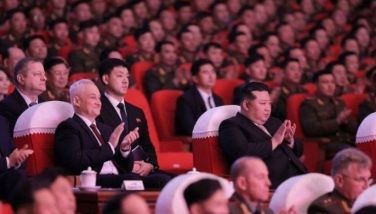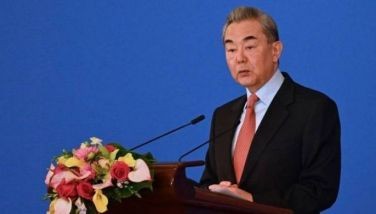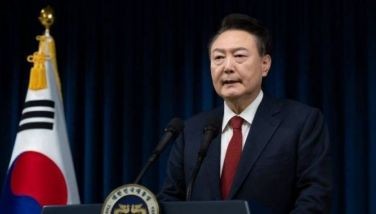Timing of Mexico drug lord's extradition seen as political
MEXICO CITY — Joaquin "El Chapo" Guzman's abrupt exit to face charges in the US marks the probable end of the career of Mexico's most notorious drug cartel boss, and a delicately timed gesture by Mexican President Enrique Pena Nieto, who faces a new and hostile US administration.
Observers differed on whether Guzman's extradition was a final-hour salute to outgoing President Barack Obama, or a gesture of obeisance to incoming President Donald Trump. Pena Nieto is already deeply unpopular, in part for his perceived mishandling of Donald Trump's tough rhetoric on Mexico.
Deputy Attorney General Alberto Elias Beltran said at a Thursday night news conference that the timing was due to a court ruling, not politics.
"It was resolved today, and we under terms of the international treaty had to make the handover immediately," he said.
But many considered the timing to have been carefully planned.
"It could be a coincidence, but I think that's unlikely," Mexican security analyst Alejandro Hope said, noting it came the last full day of Barack Obama's presidency and hours before Trump's inauguration.
"They could not send him after Trump was inaugurated because the interpretation would have been that of a tribute," Hope said. "But maybe they wanted to do it close enough so that both administrations — the outgoing and the incoming — could really make some political hay out of this."
Others saw it as a reward to Obama and a shot across the bow of Trump, who has called immigrants coming illegally from Mexico criminals and "rapists" and vowed to build a border wall and make Mexico pay for it.
"The Mexican government decided to move up the time frame because they didn't want Trump to be in the presidency when they sent him over," said Michael Vigil, the former head of international operations for the US Drug Enforcement Administration. "They wanted Obama to take credit. They wanted to send a message to Trump that they won't be bullied."
Samuel Logan of the business and security consulting firm Southern Pulse said it also probably involved practical concerns. Guzman has escaped twice from Mexican prisons, and Pena Nieto has more pressing concerns on his hands like the fast-rising Jalisco New Generation cartel, known as the CJNG.
"There might be some political aspirations in it, but I think it's more about cleaning up what loose ends he (Pena Nieto) can so he can focus on what is much more concerning, the CJNG," Logan said.
A senior US official speaking on condition of anonymity said Mexico's legal system gave the Mexican government a small window of opportunity to extradite Guzman, and it quickly took it. The window — during which Guzman's lawyers could have filed other appeals — was a matter of hours, so tight that the official acknowledged there was nervousness on both sides of the border.
One Guzman lawyer, Jose Refugio Rodriguez, said the extradition violated due process. He told the Radio Formula station that he planned to file a complaint with the Inter-American Human Rights Commission.
Guzman's departure came the same day Mexican officials announced high-level talks Jan. 25-26 in Washington. The discussions will include Mexico's newly installed top diplomat, Luis Videgaray, and key Trump administration officials such as chief of staff Reince Priebus, son-in-law and senior adviser Jared Kushner and senior adviser Stephen Bannon.
Hope said the timing also sends a message that Mexico is serious about anti-drug cooperation regardless of who occupies the White House.
Sen. Miguel Barbosa of the leftist opposition Democratic Revolution Party seized on the extradition to take a swipe at Pena Nieto. He said it was apparently the only choice after Guzman twice pulled off embarrassing escapes from maximum-security lockups.
"We should not celebrate that the Mexican state was not capable of processing the greatest criminal that has ever existed in Mexico and was not capable of guaranteeing his incarceration," Barbosa said in a statement.
Pena Nieto currently has the lowest approval ratings for any Mexican leader in the polling era. Besides his handling of Trump, Mexicans are also angry about corruption, rising drug gang violence and a Jan. 1 deregulation that led gasoline prices to spike by as much as 20 percent.
Another of Guzman's lawyer, Andres Granados, accused the government of trying to distract the public.
"They handled it politically to obscure the situation of the gas price hike," Granados said. "It's totally political."
Some Mexicans feared Guzman's extradition to the United States, where he will surely be kept from communicating with underlings, could unleash a cartel power struggle and more bloodshed.
"All the different bands are going to start fighting among themselves, no? Drug traffickers, to see who ends up being No. 1," said Roberto Lascurain, an architect in Mexico City.
Guzman associate Ismael "El Mayo" Zambada is believed to be running the cartel following "El Chapo's" recapture last January. Some analysts believe Guzman's sons may have also taken on increased roles.
Raul Benitez, a security expert at the National Autonomous University of Mexico, said Guzman's offspring may try to challenge for control in what "could be a negotiation without violence, or a war with machine guns."
However, Vigil predicted that the operations of Guzman's Sinaloa cartel are unlikely to be affected.
"Most cartels have a vertical structure, but ... Sinaloa has a horizontal one with cells that operate in a semi-autonomous manner," Vigil said. "They have a strong bench. They have a respected leader in Ismael 'El Mayo' Zambada."
On Twitter, some saw humor in Guzman's extradition the day before Trump takes office.
"'They're sending the worst, they're bringing drugs, they're criminals,'" tweeted Jorge Guajardo, Mexico's ambassador to China in 2007-2013, echoing Trump's comments about illegal immigration. "Ok, you won. Here's our very worst, El Chapo."
US presidential transitions have been used by foreign countries before to send a political message. On Jan. 20, 1981, only minutes into the presidency of Republican Ronald Reagan, Iran freed 52 American hostages it held for 444 days after the storming of the US Embassy in Tehran.
A deal between Iran and the US to unfreeze billions of dollars in Iranian assets in exchange for the hostages had been largely reached under outgoing Democratic President Jimmy Carter. But while Carter greeted the hostages on their landing in West Germany, it was Reagan who announced their freedom to cheering Americans.
- Latest
- Trending































